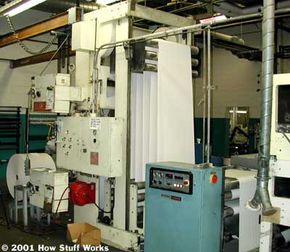Step Two: The Press Run
The printing process used to print How Stuff Works Express is called web offset lithography. The paper is fed through the press as one continuous stream pulled from rolls of paper. Each roll can weigh as much as 2,000 pounds (1 ton). The paper is cut to size after printing. Offset lithography can also be done with pre-cut paper in sheetfed presses.
Web presses print at very high speeds and use very large sheets of paper. Press speeds can reach up to 50,000 impressions per hour. An impression is equal to one full press sheet (38 inches x 22 and three-fourths inches), which is 12 pages of How Stuff Works Express.
Advertisement
Even when a 1-ton roll of paper runs out, the presses do not stop rolling. Rolls can be spliced together as the web press is running by using festoons. Festoons are a series of rollers that extend up into a tower. A few moments prior to the splice occurring, the festoons will move up into the tower, pulling in large amounts of paper. At the moment the splice occurs, the rolls of paper stop rotating for a split second, at which point the paper is taped together automatically. As the newly spliced roll begins to pick up speed, the festoons begin to drop out of the tower at a rate predetermined by the speed at which the press is operating. The press operator never has to adjust the press controls during this operation.
The press has to maintain a constant balance between the force required to move the paper forward and the amount of backpressure (resistance) that allows the paper to remain tight and flat while traveling through the equipment.
The Inking Process
Ink and water do not mix -- this is the underlying principle of offset lithography. The ink is distributed to the plates through a series of rollers. On the press, the plates are dampened, first by water rollers, then ink rollers. The rollers distribute the ink from the ink fountain onto the plates.
In the next section we'll look at the offset process.
